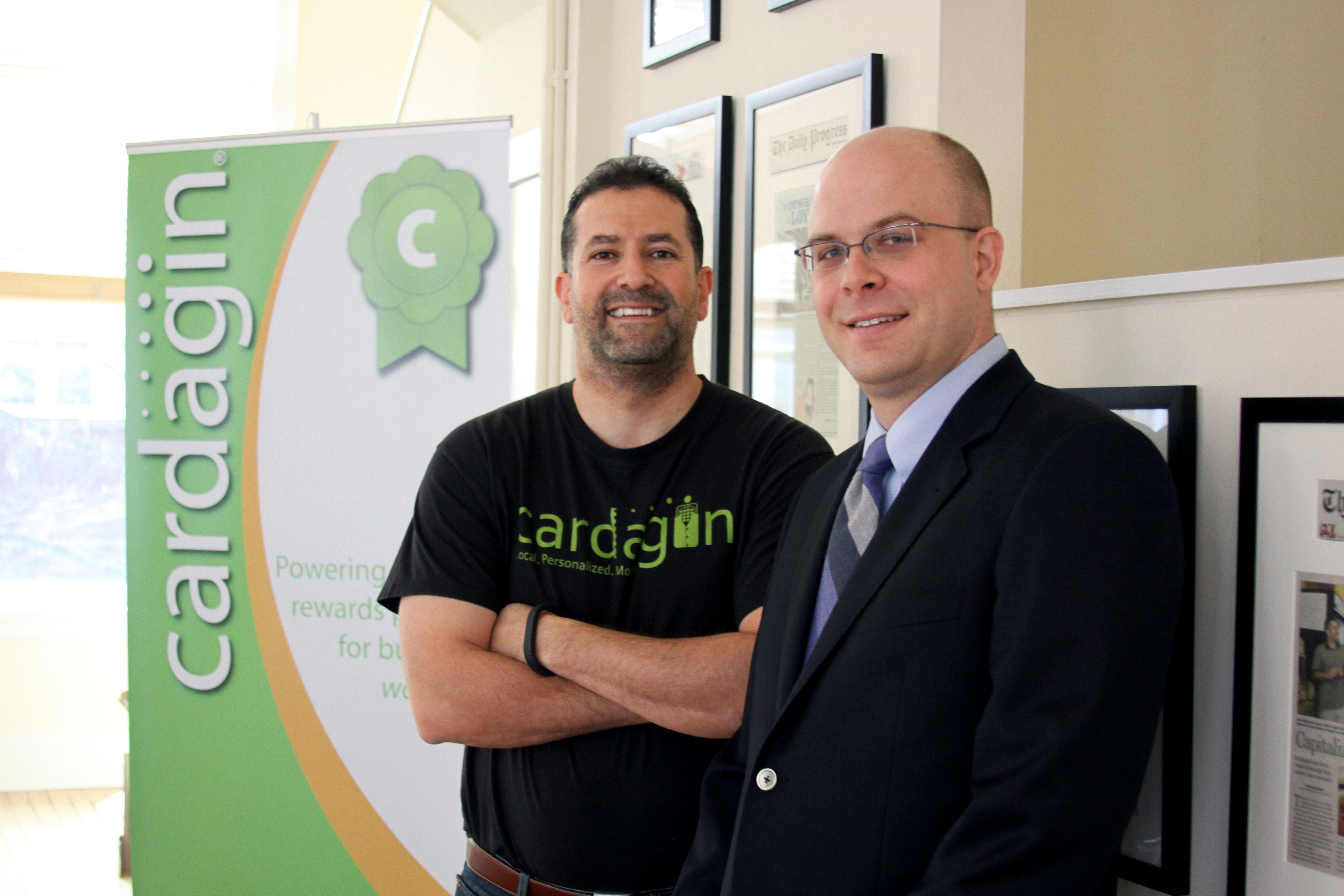Students at the University of Virginia School of Law will get an inside look on the legal steps involved in creating, developing and growing a start-up company through a new January Term course kicking off today.
The course will focus on Charlottesville-based startup firm Cardagin Networks Inc., a mobile loyalty service by which users can earn rewards for patronizing businesses such as Shenandoah Joe’s, Dunkin’ Donuts, Arby’s, Quiznos and many other local establishments.
“The course is going to be a very whirlwind introduction to startup companies and venture capital,” said U.Va. law professor Quinn Curtis, who is co-teaching the course. “It’s an opportunity for the students to learn about these things in the context of a real company from the person who runs it and understands all aspects of it.”
The one-week course, “Legal Practice and the Startup Company: An Inside Look,” is being taught by Curtis and U.Va. Law alumnus Rob C. Masri, the founder and CEO of Cardagin. Using Cardagin as a case study, the course will dig into the process of business planning, forming a corporation, raising venture capital, protecting intellectual property, day-to-day operations and exit opportunities.
“There are many classes that help students understand how to structure contracts and how to draft certain provisions,” Masri said. “Very few classes give students an inside look at what actually happened, why it happened and the economic consequences.”
Masri added that the course is meant to provide both a business and a legal perspective of starting a company, going beyond simply understanding incorporation documents and business plans.
“I want students to understand that being a transactional lawyer is about creating value and thinking of themselves as ‘transaction cost engineers,’” he said. “Students need to understand as much as possible about the businesses they are representing so that they know how to help their clients manage risk. This class is designed to give students an inside look at this specific business first and then the legal framework, rather than the other way around.”
On the first day of the class, Masri will introduce the students to Cardagin, which works with local businesses to provide a high-tech version of customer loyalty cards. Instead of a card, customers use a free downloadable app for iPhone and Android devices that tracks their spending, which gives participating businesses useful information on their customers’ spending habits as well. Cardagin’s service began in 2010 in Charlottesville and is now available in 15 states and two foreign countries.
Following the introduction, the students will be asked to consider how they would form such a company.
“Should you be an LLC? Should you be a corporation? Should it be a Virginia corporation? Should it be a Delaware corporation? We’re going to send them off to write a little memo on that question,” Curtis said. “And then, on the second day, we’re going to come back and look at [Cardagin’s] real incorporation documents.”
To explain the process of raising venture capital, the students will examine and discuss portions of Cardagin’s pitch deck and other investment documents.
In one planned exercise, some students will play venture capitalists and others will play Cardagin’s lawyers as the two sides attempt to reach a deal over funding to get the enterprise off the ground.
“One of the things we hope they’ll take away from that is that this is a negotiation in the context where you want to protect your client, but it’s really important to get to a deal,” Curtis said. “Startups depend on venture capital, so investors have a lot of bargaining power. How do you protect your client in that situation?”
The students will take a look at several other documents that are essential to operating a startup, including confidentiality agreements, consulting contracts, terms of use and more.
“Rob hasn’t updated his privacy policy in about a year – it’s a little out of date. So, as an exercise, we’re going to have [the students] do what lawyers would do, which is look at privacy policies of other companies and see if they can come up with suggestions for changes to the privacy policy based on industry standards.”
The course is also designed to give the students a sense of common problems facing businesses, both large and small.
“One of the things we’ll talk about is potential conflicts between venture capital investors when you have multiple rounds of investments,” Quinn said. “Or if you have many layers of investments, so that the residual to the founder of the company is actually getting pretty small based on the value of the company, does the founder still have an incentive to keep going?”
A key takeaway from the course, Curtis said, will be about the importance of maintaining professionalism, particularly during the venture capital process.
“This is a sort of business where when you’re looking for funding you might get one or two key shots to make a good impression, and you’re one among many companies that are seeking this kind of funding,” he said. “Even [when writing] something as informal as an email, you have to be careful to make the right impression.”
Curtis added that the course will show students how a law degree can be beneficial to entrepreneurs.
“Rob’s a lawyer and a U.Va. Law grad. He founded his own startup,” Curtis said. “Here’s an alternative career path that’s interesting and exciting. And they’ll see how Rob’s legal education is playing into his skillset.”
Media Contact
Article Information
January 14, 2013
/content/how-would-you-advise-startup-law-students-find-out-new-j-term-course

